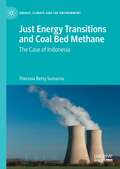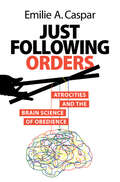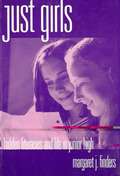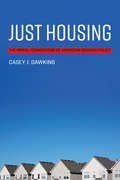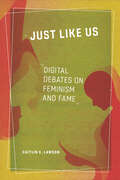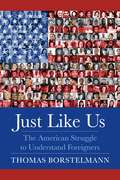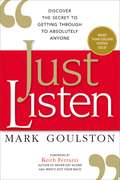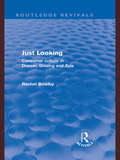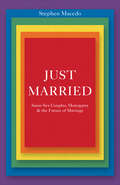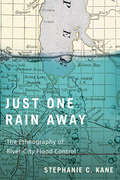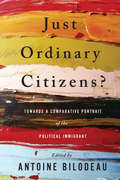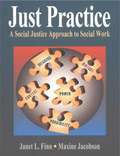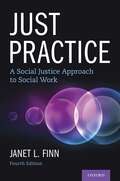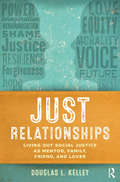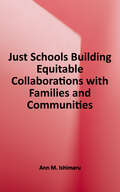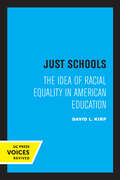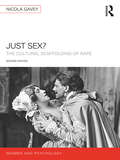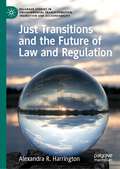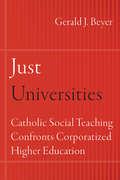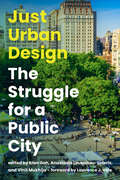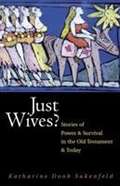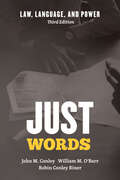- Table View
- List View
Just Energy Transitions and Coal Bed Methane: The case of Indonesia (Energy, Climate and the Environment)
by Theresia Betty SumarnoThis book discusses how Coal Bed Methane (CBM) could help the acceleration of the energy transition in a ‘just’ way in Indonesia, due to the country's potential CBM reserves (and current dependence on climate damaging coal). Developing countries face multiple challenges in achieving their energy transitions. CBM in Indonesia could potentially be a catalyst for energy transition and subsequently improve access to energy. However, CBM faces numerous challenges and although Indonesia first developed its domestic CBM sector over more than a decade ago, they are still to implement this successfully. This book exposes the challenges and opportunities of CBM, exploring what lessons other countries could learn from Indonesia to improve the industry with a view to achieving energy transition and climate change targets. This book will be an invaluable reference for researchers and practitioners working in this field.
Just Following Orders: Atrocities and the Brain Science of Obedience
by Emilie A. CasparHow can obedience and carrying out orders lead to horrific acts such as the Holocaust or the genocides in Rwanda, Cambodia, or Bosnia? For the most part, it is a mystery why obeying instructions from an authority can convince people to kill other human beings, sometimes without hesitation and with incredible cruelty. Combining social and cognitive neuroscience with real-life accounts from genocide perpetrators, this book sheds light on the process through which obedience influences cognition and behavior. Emilie Caspar, a leading expert in the field, translates this neuroscientific approach into a clear, uncomplicated explanation, even for those with no background in psychology or neuroscience. By better understanding humanity's propensity for direct orders to short-circuit our own independent decision-making, we can edge closer to effective prevention processes.
Just Girls: Hidden Literacies and Life in Junior High
by Margaret J. FindersHighlighting the social importance of friendship, family and social networks in girls' sense of themselves, she suggests that literacy plays an important role in maintaining friendship groups and in the construction of the self.
Just Housing: The Moral Foundations of American Housing Policy (Urban and Industrial Environments)
by Casey J. DawkinsA new conception of housing justice grounded in moral principles that appeal to the home&’s special connection to American life.In response to the twin crises of homelessness and housing insecurity, an emerging &“housing justice&” coalition argues that America&’s apparent inability to provide decent housing for all is a moral failing. Yet if housing is a right, as housing justice advocates contend, what is the content of that right? In a wide-ranging examination of these issues, Casey Dawkins chronicles the concept of housing justice, investigates the moral foundations of the US housing reform tradition, and proposes a new conception of housing justice that is grounded in moral principles that appeal to the home&’s special connection to American life. Dawkins examines the conceptual foundations of justice and explores the social meaning of the American home. He chronicles the evolution of American housing reform, showing how housing policy was pieced together from layers of housing and land-use policies enacted over time, and investigates the endurance—from the founding of the republic through the postwar era—of the owned single-family home as the embodiment of national values. Finally, Dawkins considers housing justice, drawing on elements of liberalism, republicanism, progressivism, and pragmatism to defend a right-based conception of housing justice grounded in the ideal of civil equality. Arguing that any defense of private property must appeal to the interests of those whose tenure is made insecure by the institution of private property, he proposes a &“secure tenure&” property regime and a &“negative housing tax&” that would fund a guaranteed housing allowance.
Just Like Family: How Companion Animals Joined the Household (Animals in Context)
by Andrea Laurent-SimpsonWinner, 2023 Animals and Society's Distinguished Book Award, presented by the American Sociological AssociationThe rise and increasingly important role of companion animals in our familiesFrom homemade meals for our dogs to high-end feline veterinary care, pets are a growing multi-billion-dollar industry in the United States. In Just Like Family, Andrea Laurent-Simpson explores the expanding role of animals in what she calls “the multi-species family,” providing a window into a world where almost 95 percent of adults who share their homes with dogs and cats identify—and ultimately treat—their animal companions as legitimate members of their families. With an insightful eye, Laurent-Simpson examines why and how these animals have increasingly become an important part of our households. She highlights their various roles in our lives, including as siblings to our existing children, as animal children themselves, and in some cases, even as grandchildren, particularly as fertility rates decline and a growing number of younger couples choose to live a childfree lifestyle. Ultimately, Laurent-Simpson highlights how animals—and their place in our lives—have changed the structure of the American family in surprising ways. Just Like Family provides a fascinating inside look at our complex relationships with our beloved animal companions in the twenty-first century.
Just Like Us: Digital Debates on Feminism and Fame
by Caitlin E. LawsonIn Just Like Us: Digital Debates on Feminism and Fame, Caitlin E. Lawson examines the rise of celebrity feminism, its intersections with digital culture, and its complicated relationships with race, sexuality, capitalism, and misogyny. Through in-depth analyses of debates across social media and news platforms, Lawson maps the processes by which celebrity culture, digital platforms, and feminism transform one another. As she analyzes celebrity-centered stories ranging from “The Fappening” and the digital attack on actress Leslie Jones to stars’ activism in response to #MeToo, Lawson demonstrates how celebrity culture functions as a hypervisible space in which networked publics confront white feminism, assert the value of productive anger in feminist politics, and seek remedies for women’s vulnerabilities in digital spaces and beyond. Just Like Us asserts that, together, celebrity culture and digital platforms form a crucial discursive arena where postfeminist logics are unsettled, opening up more public, collective modes of holding individuals and groups accountable for their actions.
Just Like Us: The American Struggle to Understand Foreigners
by Thomas BorstelmannAmericans have long considered themselves a people set apart, but American exceptionalism is built on a set of tacit beliefs about other cultures. From the founding exclusion of indigenous peoples and enslaved Africans to the uneasy welcome of waves of immigrants, from republican disavowals of colonialism to Cold War proclamations of freedom, Americans’ ideas of their differences from others have shaped the modern world—and how Americans have viewed foreigners is deeply revealing of their assumptions about themselves.Just Like Us is a pathbreaking exploration of what foreignness has meant across American history. Thomas Borstelmann traces American ambivalence about non-Americans, identifying a paradoxical perception of foreigners as suspiciously different yet fundamentally sharing American values beneath the layers of culture. Considering race and religion, notions of the American way of life, attitudes toward immigrants, competition with communism, Americans abroad, and the subversive power of American culture, he offers a surprisingly optimistic account of the acceptance of difference. Borstelmann contends that increasing contact with peoples around the globe during the Cold War encouraged mainstream society to grow steadily more inclusive. In a time of resurgent nativism and xenophobia, Just Like Us provides a reflective, urgent examination of how Americans have conceived of foreignness and their own exceptionalism throughout the nation’s history.
Just Listen: Discover the Secret to Getting Through to Absolutely Anyone
by Mark GoulstonGetting through to someone is a critical, fine art. Whether you are dealing with a harried colleague, a stressed-out client, or an insecure spouse, things will go from bad to worse if you can't break through emotional barricades and get your message thoroughly communicated and registered.Drawing on his experience as a psychiatrist, business consultant, and coach, author Mark Goulston combines his background with the latest scientific research to help you turn the &“impossible&” and &“unreachable&” people in their lives into allies, devoted customers, loyal colleagues, and lifetime friends.In Just Listen, Goulston provides simple yet powerful techniques you can use to really get through to people including how to:make a powerful and positive first impression;listen effectively;make even a total stranger (potential client) feel understood;talk an angry or aggressive person away from an instinctual, unproductive reaction and toward a more rational mindset;and achieve buy-in--the linchpin of all persuasion, negotiation, and sales.Whether they're coworkers, friends, strangers, or enemies, the first make-or-break step in persuading anyone to do anything is getting them to hear you out. The invaluable principles in Just Listen will get you through that first tough step with anyone.With this groundbreaking book, you will be able to master the fine but critical art of effective communication.
Just Looking: Consumer Culture in Dreiser, Gissing and Zola (Routledge Revivals)
by Rachel BowlbyThe spectacular development of early consumer society in Britain, France and the United States had a profound impact on constructions of femininity and masculinity, and commercial and cultural values in the late nineteenth and early twentieth centuries. Focusing on novels by Theodore Dreiser, George Gissing and Emile Zola, Just Looking, first published in 1985, addresses itself to a central paradox of the period: the perceived antithesis of the terms "commerce" and "culture" which emerged at a time which saw the actual drawing together of commercial and cultural practices. Drawing on structural, psychoanalytic and Marxist-feminist theory, Rachel Bowlby retrieves a relatively neglected literary area for contemporary political and theoretical concerns, re-establishing the naturalist novel as a rich source for feminists, literary theorists and cultural historians.
Just Married
by Stephen MacedoThe institution of marriage stands at a critical juncture. As gay marriage equality gains acceptance in law and public opinion, questions abound regarding marriage's future. Will same-sex marriage lead to more radical marriage reform? Should it? Antonin Scalia and many others on the right warn of a slippery slope from same-sex marriage toward polygamy, adult incest, and the dissolution of marriage as we know it. Equally, many academics, activists, and intellectuals on the left contend that there is no place for monogamous marriage as a special status defined by law. Just Married demonstrates that both sides are wrong: the same principles of democratic justice that demand marriage equality for same-sex couples also lend support to monogamous marriage.Stephen Macedo displays the groundlessness of arguments against same-sex marriage and defends marriage as a public institution against those who would eliminate its special status or supplant it with private arrangements. Arguing that monogamy reflects and cultivates our most basic democratic values, Macedo opposes the legal recognition of polygamy, but agrees with progressives that public policies should do more to support nontraditional caring and caregiving relationships. Throughout, Macedo explores the meaning of contemporary marriage and the reasons for its fragility and its enduring significance. His defense of reformed marriage against slippery slope alarmists on the right, and radical critics of marriage on the left, vindicates the justice and common sense of the emerging consensus. Casting new light on today's debates over the future of marriage, Just Married lays the groundwork for a stronger institution.
Just One Rain Away: The Ethnography of River-City Flood Control
by Stephanie C. KaneNot long ago it seemed flood control experts were close to mastering the unruly flows funnelling toward Hudson Bay and the Prairie city of Winnipeg. But as more intense and out-of-synch flood events occur, wary cities like Winnipeg continue to depend on systems and specifications that will soon be out of date. Rivers have impulses that defy many of the basic human assumptions underpinning otherwise sophisticated technologies. This is the river-city expression of climate change.In Just One Rain Away Stephanie Kane shows how geoscience, engineering, and law converge to affect flood control in Winnipeg. She questions technicalities produced and maintained in tandem with settler folkways at the expense of the plural legal cultures of Indigenous nations. The dynamics of this experimental ethnography feel familiar yet strange: here, many of the starring actors are not human. Ice and water – materializing as bodies, elements, and digital signals – act with diatoms, diversions, sensors, sandbags, and satellites, looping theories about glacial erratics and feminist science studies into scenes from neighbourhood parks, conferences, survey maps, plays, archival photos, a novel, an emergency press conference, LiDAR images, and a lab experiment in a bathtub. Through storytelling and environmental analytics, Just One Rain Away provides a starting point for cross-cultural discussions about how expert knowledge and practice should inform egalitarian decision-making about flood control and, more broadly, decolonize current ways of thinking, being, and becoming with rivers.
Just Ordinary Citizens?: Towards a Comparative Portrait of the Political Immigrant
by Antoine BilodeauSince the 1960s, the number of immigrants living in liberal democracies has been steadily rising. Despite the existence of numerous studies on social, economic, and geographic integration, few books have addressed the integration of immigrants into the politics of their host countries. When it comes to politics, are immigrants just ordinary citizens?This edited collection considers the political integration of immigrants in a number of liberal democracies. Just Ordinary Citizens? offers a behavioural perspective on the political integration of immigrants, describing and analysing the relationships that immigrants develop with politics in their host countries. The chapters provide both unique national insights and a comparative perspective on the national case studies, while editor Antoine Bilodeau offers both a framework within which to understand these examples and a systematic review of more than 300 studies of immigrant political integration from the last sixty years.
Just Practice: A Social Justice Approach to Social Work
by Janet L. Finn Maxine JacobsonSocial work in the 21st century calls for new ways of thinking and acting in order to address these challenges and realize our professional commitment to social justice.
Just Practice: A Social Justice Approach to Social Work
by Janet L. FinnJust Practice: A Social Justice Approach to Social Work provides a foundation for critical and creative social work that integrates theory, history, ethics, skills, and rights to respond to the complex terrain of 21st century social work. Just Practice puts the field of social work's expressed commitment to social justice at center stage with a framework that builds upon five key concepts: meaning, context, power, history, and possibility. How do we give meaning to the experiences and conditions that shape our lives? What are the contexts in which those experiences and conditions occur? How do structures and relations of power shape people's lives and the practice of social work? How might a historical perspective help us to grasp the ways in which struggles over meaning and power have played out and to better appreciate the human consequences of those struggles? Taken together, these concepts provide a guide for integrative social work that bridges direct practice and community building. The text prepares readers with the theoretical knowledge and practice skills to address the complex challenges of contemporary social work from direct practice with individuals and families, to group work, organizational and community change, and policy analysis and advocacy. Each chapter includes learning activities, reflection moments, practice examples, and the stories and voices of practitioners and service users to engage students as critical thinkers and practitioners. The author encourages teachers and students alike to take risks, move from safe, familiar, pedagogical spaces and practices, challenge assumptions, and embrace uncertainty.
Just Relationships: Living Out Social Justice as Mentor, Family, Friend, and Lover
by Douglas L. KelleyBringing a social justice lens to daily interpersonal relationships, Just Relationships offers a perspective on existing social science theory that demonstrates how our personal relationships should be grounded in fairness and justice. Douglas Kelley utilizes concepts from a variety of academic disciplines and helping professions to examine the barriers encountered in achieving balanced partnerships. This student-friendly book brings the important new perspective of social justice to courses focusing on interpersonal relationships and family relationships, supplementing traditional textbooks. This book presents key relationship theories in each chapter and then applies them from a social justice perspective; uses thought-provoking case studies and guiding questions to enhance student learning; examines a number of different types of interpersonal relationships including family, friends, lovers, and mentor-mentee relationships within a variety of socioeconomic and sociocultural contexts.
Just Relationships: Living Out Social Justice as Mentor, Family, Friend, and Lover
by Douglas L. KelleyBringing a social justice lens to daily interpersonal relationships, Just Relationships offers a perspective on existing social science theory that demonstrates how our personal relationships should be grounded in fairness and justice. Douglas Kelley utilizes concepts from a variety of academic disciplines and helping professions to examine the barriers encountered in achieving balanced partnerships. This student-friendly book brings the important new perspective of social justice to courses focusing on interpersonal relationships and family relationships, supplementing traditional textbooks. This book presents key relationship theories in each chapter and then applies them from a social justice perspective; uses thought-provoking case studies and guiding questions to enhance student learning; examines a number of different types of interpersonal relationships including family, friends, lovers, and mentor-mentee relationships within a variety of socioeconomic and sociocultural contexts.
Just Schools: Building Equitable Collaborations with Families and Communities (Multicultural Education Series)
by Ann M. IshimaruThis book examines the challenges and possibilities for building more equitable forms of collaboration among non-dominant families, communities, and schools. The text explores how equitable collaboration entails ongoing processes that begin with families and communities, transform power, build reciprocity and agency, and foster collective capacity through collective inquiry. These processes offer promising possibilities for improving student learning, transforming educational systems, and developing robust partnerships that build on the resources, expertise, and cultural practices of non-dominant families. Based on empirical research and inquiry-driven practice, this book describes core concepts and provides multiple examples of effective practices. <p><p>Book Features: <p>• Broadens the dominant conception of leadership to include traditionally marginalized parents and communities as potential educational leaders. <p>• Explores partnerships from both a system-wide and in-school basis, with detailed portraits of what is possible. <p>• Translates theoretical principles at multiple scales: systemic, school, and individual practice. <p>• Shares studies focused on a broad range of contexts, strategies, and practices for enacting equitable collaboration with families.
Just Schools: The Idea of Racial Equality in American Education
by David L. KirpThis title is part of UC Press's Voices Revived program, which commemorates University of California Press’s mission to seek out and cultivate the brightest minds and give them voice, reach, and impact. Drawing on a backlist dating to 1893, Voices Revived makes high-quality, peer-reviewed scholarship accessible once again using print-on-demand technology. This title was originally published in 1982.
Just Sex?: The Cultural Scaffolding of Rape (Women and Psychology)
by Nicola GaveyIn the award-winning Just Sex? The Cultural Scaffolding of Rape, Nicola Gavey provides an extensive commentary on the existing literature on rape, analysing recent research to examine the psychological and cultural conditions of possibility for contemporary sexual violence. Just Sex? argues that feminist theory on sexual victimization has gone both too far and not far enough. It presents the reader with a challenging and original perspective on the issues of rape, sex and the body, incorporating new material on sexism, misogyny and digital culture, as well as debates over gendered analyses of sexual violence. The second edition has been updated and expanded to be extremely timely and relevant, with the most recent high-profile rape cases – the Stanford rape case and the Belfast rape case – being tried in the media and online. The rise of the Hollywood Harvey Weinstein scandal and the #MeToo movement makes this book incredibly useful and necessary to those who are working within the area of sexual violence. This will appeal to academic readers studying psychology, sociology, and criminology, as well as those looking into cultural influences on society. It will also be very useful to those working in the professional sector on prevention and with people who have been subjected to sexual violence.
Just Transitions and the Future of Law and Regulation (Palgrave Studies in Environmental Transformation, Transition and Accountability)
by Alexandra R. HarringtonThis book provides a comprehensive assessment of how national and international efforts to achieve carbon neutrality have been embraced as necessary to meet the requirements of the Paris Agreement as well as the needs of the planet. The authors explore the increasing tensions between aspirations and entrenched practices as methods to implement carbon neutrality are devised, particularly at the national and sub-national levels. This is perhaps best typified by efforts to shift from “dirty” energy production, such as coal, to greener alternatives, which are often supported in laws and rules but opposed by society. To bridge this void, the concept of just transitions has increasingly come to the forefront of international and national focus yet is often poorly understood. This book examines the ways in which just transitions have been proposed as a legal and regulatory bridge to address issues that result in societal resistance to implementation. It uses past and existing practice studies of just transitions before providing an analysis of how just transitions can be used to not only to assist in the shift to carbon neutrality but also in new shifts such as those caused by the Covid-19 pandemic impacts on economy, environment and society, and to address future global challenges.
Just Universities: Catholic Social Teaching Confronts Corporatized Higher Education (Catholic Practice in North America)
by Gerald J. BeyerGerald J. Beyer’s Just Universities discusses ways that U.S. Catholic institutions of higher education have embodied or failed to embody Catholic social teaching in their campus policies and practices. Beyer argues that the corporatization of the university has infected U.S. higher education with hyper-individualistic models and practices that hinder the ability of Catholic institutions to create an environment imbued with bedrock values and principles of Catholic Social Teaching such as respect for human rights, solidarity, and justice. Beyer problematizes corporatized higher education and shows how it has adversely affected efforts at Catholic schools to promote worker justice on campus; equitable admissions; financial aid; retention policies; diversity and inclusion policies that treat people of color, women, and LGBTQ persons as full community members; just investment; and stewardship of resources and the environment.
Just Urban Design: The Struggle for a Public City (Urban and Industrial Environments)
by Lawrence J. ValeContributions by urban planners, sociologists, anthropologists, architects, and landscape architects on the role and scope of urban design in creating more just and inclusive cities.Scholars who write about justice and the city rarely consider the practices and processes of urban design, while discourses on urban design often neglect concerns about justice. The editors of Just Urban Design take the position that urban design interventions have direct and important implications for justice in the city. The contributions in this volume contextualize the state of knowledge about urban design for justice, stress inclusivity as the key to justice in the city, affirm community participation and organizing as cornerstones of greater equity, and assert that a just urban design must center and privilege our most marginalized individuals and communities. Approaching spatial and social justice in the city through the lens of urban design, the contributors explore the possibility of envisioning and delivering social, spatial, and environmental justice in cities through urban design and the material reality of built environment interventions. The editors&’ combined expertise includes urban politics and climate change, public space, mobility justice, community development, housing, and informality, and the contributors include researchers and practitioners from urban planning, sociology, anthropology, architecture, and landscape architecture. Contributors: Rachel Berney, Rebecca Choi, Teddy Cruz, Diane E. Davis, Fonna Forman, Christopher Giamarino, Kian Goh, Alison B. Hirsch, Jeffrey Hou, Anastasia Loukaitou-Sideris, Setha Low, Matthew Jordan Miller, Vinit Mukhija, Chelina Odbert, Francesca Piazzoni, and Michael Rios.
Just Wives?: Stories of Power and Survival in the Old Testament and Today
by Katharine Doob SakenfeldGiving astute attention to social worlds of women of both ancient and modern times, Katharine Sakenfeld explores the stories of eleven women in the Old Testament. In clear and engaging fashion, she reveals the complexity of these women's lives, drawing out the issues they faced and relating their struggles to those women around the world face today. By encouraging women from across the world, in various cultures, to bring their own experiences to the biblical texts, and sharing the interpretation of some who already have, Sakenfeld allows her readers to see new possibilities for meaning in the Scriptures. Issues discussed include violence, sexual allure, personal betrayal, marginalization, power, and economic survival. Includes study questions for group discussion.
Just Words: Law, Language, and Power (Chicago Series in Law and Society)
by Robin Conley Riner John M. Conley William M. O'BarrIs it “just words” when a lawyer cross-examines a rape victim in the hopes of getting her to admit an interest in her attacker? Is it “just words” when the Supreme Court hands down a decision or when business people draw up a contract? In tackling the question of how an abstract entity exerts concrete power, Just Words focuses on what has become the central issue in law and language research: what language reveals about the nature of legal power. John M. Conley, William M. O'Barr, and Robin Conley Riner show how the microdynamics of the legal process and the largest questions of justice can be fruitfully explored through the field of linguistics. Each chapter covers a language-based approach to a different area of the law, from the cross-examinations of victims and witnesses to the inequities of divorce mediation. Combining analysis of common legal events with a broad range of scholarship on language and law, Just Words seeks the reality of power in the everyday practice and application of the law. As the only study of its type, the book is the definitive treatment of the topic and will be welcomed by students and specialists alike. This third edition brings this essential text up to date with new chapters on nonverbal, or “multimodal,” communication in legal settings and law, language, and race.
Just Work
by Grant Michelson Shaun RyanExploring major questions such as what people want from their work and why, Just Work discusses both new and enduring themes, examining to what extent this is accounted for by a changing environment of work since the 1970s.
